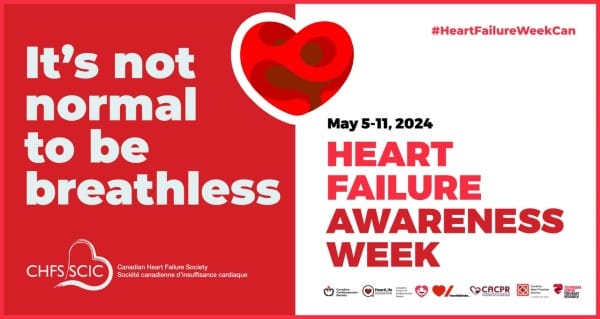You may have seen a heart attack occurring in the movies, with the victim violently clutching at their chest, followed by a dramatic fall to the ground. However, the symptoms of a heart attack are often much more subtle, and it is not always immediately apparent what is happening. Certain signs to watch out for may indicate a heart attack, and several risk factors can increase the likelihood of heart problems.
Risk Factors for Cardiovascular Disease
There are a range of risk factors that make an individual more prone to cardiovascular disease and suffering a heart attack.
Some of these risks include:
- Age
- Obesity
- High cholesterol
- High blood pressure
- Type 2 diabetes
- Genetics
- Gender
- Poor lifestyle choices
Heart Failure
Heart Failure is one of the fastest-growing cardiovascular conditions in the world. In Canada, more than 100,000 Canadians will be diagnosed this year alone, adding to the 800,000 people already living with Heart Failure. To raise awareness and promote prevention, Heart Failure Awareness Week is observed from May 4-10, 2025. This week is dedicated to educating the public about heart failure and its risk factors.

Factors that Increase Heart Problems
Age
The age at which increased risk becomes a factor for heart attacks differs for men and women. For men, the age at which a heart attack begins to become more likely is 45, while for women, the age is 55.
Obesity
Obesity has been a growing issue in the Western world, and with it comes a greater risk for a variety of health problems, including cardiovascular disease. Carrying around extra weight forces the heart to work harder to deliver the required oxygen and nutrients to all the cells in the body.
High Cholesterol
High cholesterol is another risk factor for heart problems. The focus here is on the harmful type of LDL cholesterol. High levels of Low-Density Lipoprotein (LDL) cholesterol can cause plaque on the artery walls, making blood flow more difficult.
High Blood Pressure
Hypertension, or high blood pressure, increases the risk of a heart attack by putting excess stress on the coronary arteries. This stress can damage the arteries, causing them to narrow and harden. High blood pressure makes the heart work extra hard, but the pumping action is less effective due to narrowed arteries.
Type 2 Diabetes
The prevalence of type 2 diabetes is steadily on the rise in North America. Elevated blood glucose levels and insulin resistance characterize type 2 diabetes. Type 2 diabetes can cause damage to blood vessels and nerves associated with the heart, increasing the risk of heart attack and stroke.
With the day-to-day challenges seniors with diabetes encounter, explore how at-home nursing care is pivotal in empowering them to lead active and fulfilling lives.
Genetics
If your family has a history of heart disease, it can also increase your risk for heart problems and heart attacks. Genetic factors play some role in cardiovascular disease, and risk factors for it, like high blood pressure. Aside from genetic heredity, family history may also play a role through shared environment and learned life practices. The lifestyle and habits you learn from your family can also contribute to your risk of heart disease.
Gender
We already looked at how age affects risk factors for each gender, with men being at a greater risk of heart attack at a lower age. Men are at a greater risk in general for heart problems. Women, however, have reported experiencing symptoms far in advance of a heart attack, such as unexplained fatigue, sleep issues, respiratory problems, anxiety, and indigestion.
Poor Lifestyle Choices
Unhealthy choices are also a risk factor for heart attack. Things like poor diet, lack of exercise, smoking, and excess use of alcohol and narcotics can all contribute to the risk of cardiovascular disease and heart attack. Physical activity for seniors helps prevent heart disease.

Symptoms and Warning Signs of a Heart Attack
A quick reaction in the instance of a heart attack can make all the difference for a successful recovery. Knowing what to look for can help save a life, and some of the symptoms to watch for include:
- Chest pains
- Tightness in the chest, arms, neck, back, or jaw
- Irregular heartbeat
- Heartburn or indigestion
- Nausea or vomiting
- Loss of breath
- Dizziness
- Cold sweats
- Fatigue
- General weakness
- Anxiety or restlessness
- Lips, hands, or feet turning blue
- Swelling in the joints
- Incessant cough that produces white or pink mucus
These are some examples of possible symptoms of a heart attack. Each situation will be different, so it is critical to recognize all the factors. Some people experience more pronounced symptoms, while others have milder ones.
Sometimes, a heart attack strikes suddenly, and other times, symptoms appear days or even weeks in advance. If you or a loved one is experiencing any combination of these symptoms, it is better to err on the side of caution and call 911 immediately.



